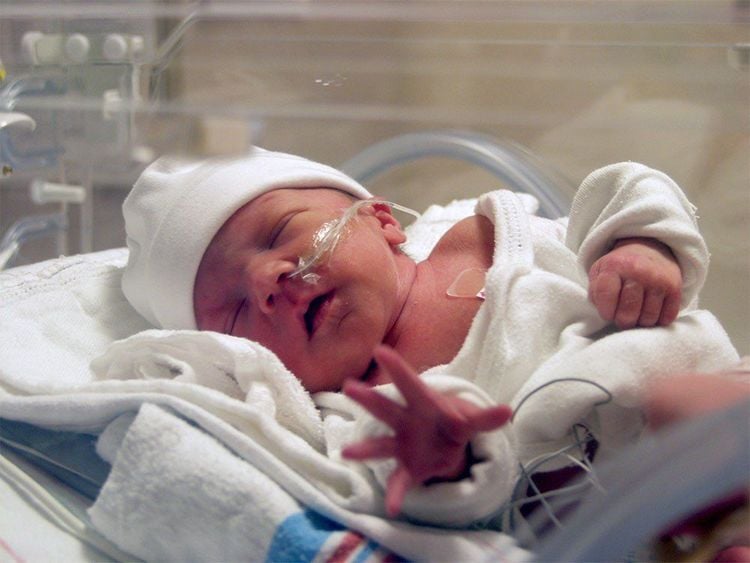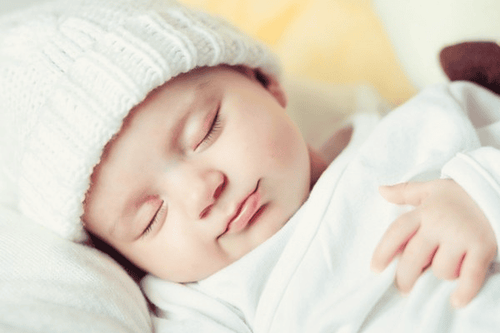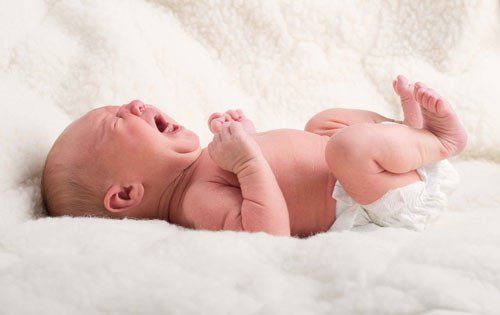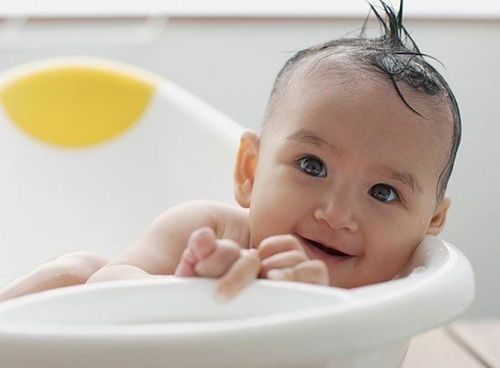This is an automatically translated article.
The article was professionally consulted by resident Doctor Duong Van Sy - Resident Doctor of Pediatrics - Department of Pediatrics - Neonatology - Vinmec Hai Phong International General Hospital.Pneumonia is a common infection in infants. If not treated promptly and aggressively, neonatal pneumonia can be fatal for babies, especially in premature, low birth weight babies.
1. What is neonatal pneumonia?
Neonatal pneumonia is inflammation or infection of the lung parenchyma. Pneumonia can occur before, during, or after birth.1.1 Types of neonatal pneumonia
Congenital pneumonia: Occurs before birth, in the last months of pregnancy, bacteria (Mycobacterium tuberculosis, Treponema Pallidum, Listeria monocytogenes), viruses (Rubella, Cytomegalovirus, Herpes simplex) cross the placenta into the fetus causing pneumonia soon after birth. Pneumonia occurs during delivery: Mainly because the mother has an infection of the genital tract or premature rupture of membranes, bacteria attack the newborn causing pneumonia. Common types of bacteria include: Listeria monocytogenes, Enterobacter, E.Coli, Group B Streptococcus, Klebsiella, Proteus. Children can also get pneumonia from inhaling meconium. This is a case of severe pneumonia, which should be treated immediately; Postpartum pneumonia: Pneumonia caused by bacterial infection from the surrounding environment, mainly seen in hospitalized babies or mothers with poor hygiene. Some bacteria that often cause postpartum pneumonia in newborns are: Klebsiella, S.Aureus, S.Pneumoniae, H.influenzae, Pseudomonas

Ngay khi sinh ra, trẻ đã có thể bị viêm phổi
1.2 Symptoms of pneumonia in infants
Because the infant's respiratory tract is still immature, the clinical symptoms are often unclear and easily overlooked. The warning signs of pneumonia in infants are:
Symptoms of infection: Poor suckling, aborting, vomiting, abdominal distention, fever over 37.5 degrees Celsius, hypothermia, fatigue, lethargy, decreased body temperature. reflex,...; Respiratory symptoms: Shortness of breath, wheezing, cough, breathing rate 60 times/minute, chest constriction breathing, groaning, pauses in breathing lasting more than 20 seconds, cyanosis of lips and skin,...
2. Why are babies prone to pneumonia?
Newborns can develop lung infections before, during, or after birth because of the timing of the rupture of membranes. Newborns can develop pneumonia at birth from inhaling infected amniotic fluid, meconium or secretions from the mother's genital tract; During delivery, postpartum resuscitation and newborn care, if aseptic requirements are not met, the child is susceptible to infection from medical instruments, the environment and caregivers, causing pneumonia; Babies born prematurely, underweight because of immature esophageal reflexes, irregular muscle movements or gastroesophageal reflux, leading to pneumonia; When breastfeeding, babies often vomit and regurgitate. If the child mistakenly inhales milk into the trachea, it will cause symptoms such as shortness of breath, shortness of breath, cyanosis of the skin and lips. The more milk inhaled, the more likely it is to cause pneumonia; Newborn babies are susceptible to pneumonia due to diseases such as dermatitis, inflammation of the oral cavity, inflammation of the umbilical cord,... Incorrect child care habits: Incubating the baby is too warm, sweating a lot but not changing clothes, causing sweating. perspiration pervades and the child gets cold; improper use of cooling equipment; Letting children go out early in the morning or late at night without keeping warm carefully, ... also causes pneumonia in children. The respiratory apparatus in infants and young children is immature and incomplete, the airways are narrow and short, so when inflamed, it can easily cause edema of the airway mucosa, making it difficult for children to breathe and inflammation easily spreads. wide. That is why pneumonia in children often progresses very quickly and is severe.

Một trong những nguyên nhân khiến trẻ sơ sinh bị viêm phổi là do sinh non
3. Measures to prevent pneumonia in infants
During pregnancy, pregnant women need to go for regular check-ups to promptly detect and intervene when there are abnormal health problems that may adversely affect the fetus; Giving birth at reputable medical facilities to ensure the safety of mother and baby; Careful care for mother and baby after birth; Breastfeeding infants exclusively, properly to strengthen the baby's resistance; Caregivers should wash their hands with soap before and after taking care of the baby to avoid spreading bacteria to the baby; Child care equipment needs to be clean, dry, sterile and avoid contact with sources of infection. Newborns are susceptible to pneumonia. This is a serious disease that can lead to death, especially in premature and low birth weight babies. However, the symptoms of pneumonia in infants are often not obvious, so it is easy to miss. Therefore, parents need to pay special attention to the symptoms of respiratory infections in children such as breastfeeding, coughing, difficulty breathing, crying, etc. timely and effective treatment.
To register for examination and treatment at Vinmec International General Hospital, you can contact Vinmec Health System nationwide, or register online HERE.














